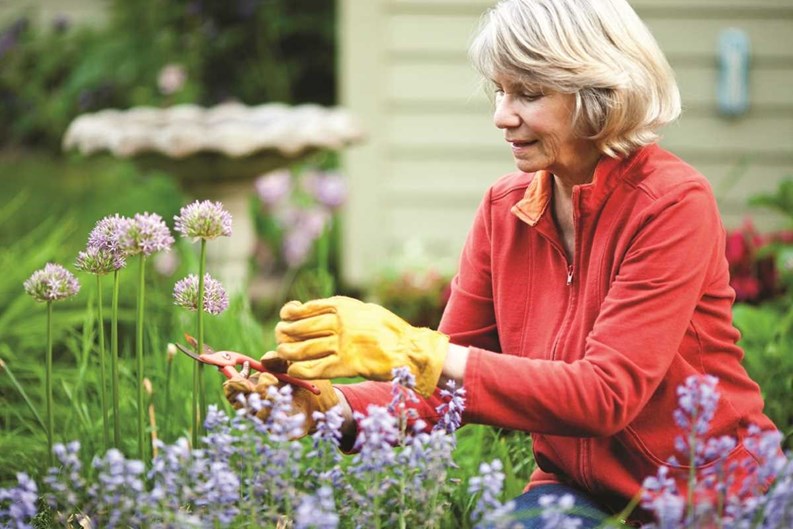No matter what the size of your community, one of the goals of any condo or HOA's landscaping plan is to increase owners’ enjoyment of their property and enhance the value of the investment in their home. Larger condo complexes often have a landscaper in house and/or under contract to care for the lawns, flowers, greenery and other plantings around the property. Smaller associations may have a lawn or landscaping service to do a quick weekly grass cutting, but due to the limitations of the modest size and budget, a personal touch from one or more green-thumbed condo owners can enhance the community’s curb appeal.
Getting Started
Many condominium associations encourage residents to get more involved in the planning, designing, planting, and caring for exterior flora, whether it’s sprucing up flowerbeds, courtyards, and entrances or researching the costs for suitable shrubs and other horticultural specimens for upgrading their property. These activities are commonly handled by a gardening or landscaping committee.
There are a variety of ways to start a garden or landscaping committee. Sometimes the genesis is from a resident who just enjoys gardening or it may be a handful of residents who decide to form a committee to examine ways to improve and replace decades-old and overgrown landscaping encroaching upon the building and entrances.
“If residents are interested in forming a landscape committee they should outline the duties and share the relevant financial information. They should also be clear about any timing expectations, for example if a project is to be extended over a multi-year period or if it needs to be completed by a certain date when proposals are to be presented to the board for a vote,” says Christine E. Evans, CMCA, PCAM and the Florida regional vice president of Associa. “There are so many benefits of having a landscape committee, but the biggest one is that it fosters volunteerism.”
Avoiding Conflict
For the condo board and manager, avoiding conflict between the landscaping committee and the landscape contractor is indeed a delicate dance, especially if the committee takes a heavy-handed approach toward the property’s landscaping activities.
“Landscape committees often want to do much more than the budget allows,” says Evans. “Another drawback is that the board doesn’t support major changes that they want to make, both of which can be resolved by creating a committee charter that clearly outlines the parameters for the committee and set straightforward budgetary restraints.”
Jeremy Wehby, president of Grounds Group Landscaping in Fort Lauderdale agrees with Evans on the importance of a landscape committee agreeing on a budget as the first order of business. “Landscape committees should iron out a budget and agree on a direction and look they want to go in before contacting a landscaper,” says Wehby. “Landscape committees are very popular, but sometimes you will have five residents on the landscaping committee and one will say ‘I want all palms,’ and another one will say ‘I want all flowers,’ and another will say ‘I want a manicured look,’ and someone else will say ‘I want a more tropical look.’ So it’s extremely important to get a solid understanding of what direction you want to go in before contacting me. It also saves a lot of time.”
“The best advice I can provide is that landscape committees try to know as much as possible about what it is they want to do,” adds Kevin Hunt, associate general manager of Nanak’s Landscaping Inc. in Deerfield Beach. “Educated customers are the best, because they have realistic expectations. Also, creating a clear scope of work with a realistic budget will alleviate a number of misunderstandings down the line.”
The owner of the landscape or gardening company ideally will have good technical skills and knowledge of plant material, fertilization, and weed control. He or she may even have specific state licenses. According to experts, it is best to avoid a discussion or confrontation between the committee member and the contractor/business owner regarding which month is best to prune roses; where, how and when to apply weed control; and how much mulch is required to be beneficial. The landscapers are the professionals and even though volunteers on the landscape/garden committee may have green thumbs, they are not the professionals.
Brining People Together
One of Evans’ goals as a property manager is to bring the committee and the landscaper together to make these decisions. Evans also maintains that the board should determine guidelines for the landscaping committee to keep things under control.
“When there’s an extremely active and capable committee, often they want to do much of the directing,” says Evans. “While we aim to have our managers considered as a consultative resource, we also don’t want to discourage volunteers by insisting that the manager handle the oversight. A good balance can be created where there is a good working relationship established that takes into consideration all the details of each project.”
The duties of a condominium gardening or landscaping committee can vary as much as the people serving on them. Some groups are very hands-on, with members getting their hands dirty planting, weeding, and maintaining. Others are more conceptual—concerned with the design and aesthetic look of the landscaping and opt out of donning their gardening gloves—offering well-researched suggestions on what areas may need attention at their properties. These could be overgrown wooded areas, patches of bare lawn, or prominent spaces lacking colorful blooms.
Surveying the Scene
Experts recommend various landscaping committee members to walk their properties with the to examine the grounds, identify and determine what plantings might need to be replaced, removed, pruned and maintained and to take that walk again with the landscaper. It is important for committee members not to get caught up in the emotional aspects of landscaping and to view the project from the community’s standpoint.
“I’ve worked with many landscape committees,” says Wehby. “When we come in at the beginning we’ll get a set of plans from a landscape architect and then meet with the committee to make sure that the plan meets their expectations. Sometimes we will come in and just do renovations and other times we will come in and just do improvements.”
A committee needs to establish a sense of credibility to be taken seriously in a community. For condo associations looking to establish a gardening or landscaping committee there are numerous resources to turn to.
“Landscape companies themselves often have great resources to offer that include professional advice regarding benefits and pitfalls of particular plant materials, real time/life examples of work they’ve done of a similar nature to what is being considered along with the advice of arborists,” says Evans. “In some areas there are city, county and state organizations that offer localized information as well.”
“There are many excellent resources online especially through the University of Florida’s Institute of Food and Agriculture Sciences department or through the local county extension office,” adds Hunt. One of the best sites is http://fyn.ifas.ufl.edu.
According to the pros, having a game plan is critical. One idea is for committee members to meet with the property manager and landscaper before the planting and pruning season begins to discuss the actual specifics of the landscape contract. And as always, communication is key.
“One of the positives of a landscaping committee is that you get a pulse of what the needs and wants are of the entire community,” says Wehby.
The ability of the landscaping committee to work with the community is crucial because in most communities there are restrictions on what residents can do with the landscaping around their unit. In those instances the landscaping committee must help the community to understand the approval process to ensure consistency and an overall landscape design.
Landscaping not only helps a condo or HOA increase its property value but it also has a positive impact on the community as a whole—stunning green spaces and plantings increase pride of ownership, influence morale and makes a residence overall more pleasant to live in.
Cynthia Allegrezza is a freelance writer in Massachusetts. Staff writer Christy Smith-Sloman contributed to this article.





Leave a Comment